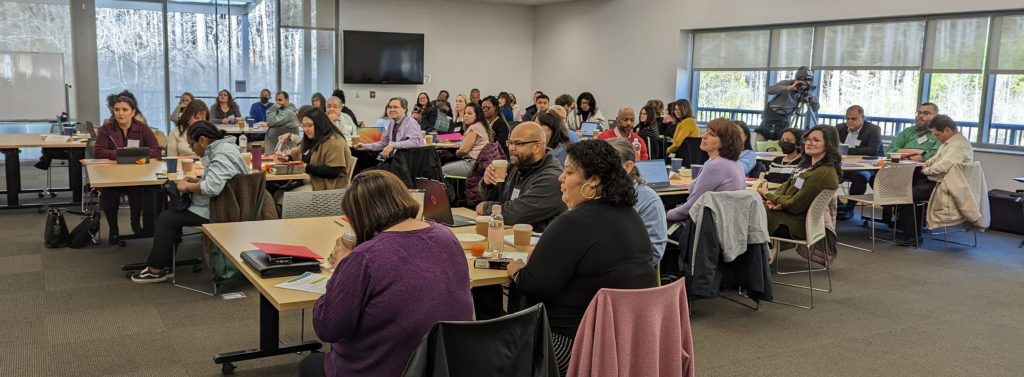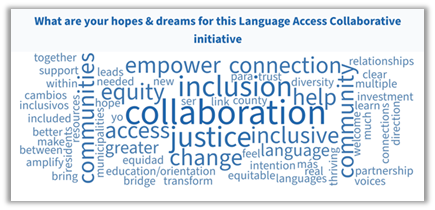Bridges, not Barriers: Building Integrated Communities Hosts Summit for Language Access Collaborative
En español aquíOn January 27, 2023, teams of local government officials and community organizations from nine NC locales came together at the Chapel Hill Public Library to kick off the 2023 Language Access Collaborative. Facilitated by the Building Integrated Communities (BIC) program at the Institute for the Study of the Americas at UNC Chapel Hill (ISA), the Collaborative’s nine teams will discuss promising practices and share resources in a series of monthly workshop exchanges. Those teams will then create localized action plans to address the need for expanding language access and to strengthen communication between local government and diverse communities, treating language as a bridge rather than a barrier. These efforts recognize that North Carolinians with experiences of immigration bring important knowledge and perspectives to their communities.
The summit began with welcome remarks delivered in Spanish and English by ISA Associate Director Hannah Gill. Thereafter, Language Access Coordinator Susan Clifford and Bilingual Program Coordinator Emily Spangenberg introduced the nine teams (in total sixty-two participants present) to key language access, interpretation, and translation concepts; and provided orientation for the coming workshops. Program Associate Brianna Gilmore, a familiar face to the teams as a main contact during the planning process, joined in handling questions and comments during the discussion. Some of the topics raised by participants included: seeing languages as bridges instead of barriers; ensuring that bilingual staff is compensated appropriately; and remaining cognizant of how different languages and cultures can interact respectfully. These conversations provide a glimpse of the fruitful collaboration in store for the year ahead.
 Along the way, participants engaged in team-building activities to get to know each other, acknowledge the community languages they will focus on, and strategize on how to work together. Several teams underscored their commitment to respecting each member’s opinion and to encourage active participation, even when disagreements arise. One team set a safe word (“mango”) for when passions rise and the team needs to step back and rally. Such instances underscored the friendly, and occasionally humorous, atmosphere notable throughout the summit as well as the diverse set of experiences that members bring to each team.
Along the way, participants engaged in team-building activities to get to know each other, acknowledge the community languages they will focus on, and strategize on how to work together. Several teams underscored their commitment to respecting each member’s opinion and to encourage active participation, even when disagreements arise. One team set a safe word (“mango”) for when passions rise and the team needs to step back and rally. Such instances underscored the friendly, and occasionally humorous, atmosphere notable throughout the summit as well as the diverse set of experiences that members bring to each team.

Among other highlights, summit participants heard from Wanda Allen-Abraha, Director of Winston-Salem’s Human Relations Diversity, Equity, and Inclusion Department. She provided a stimulating presentation on the significance of the 1964 Civil Rights Act’s Title VI and its implications for language access efforts. And Sarah Viñas, Director of Chapel Hill’s Affordable Housing and Community Connections Department, provided a useful example in describing Chapel Hill’s language access plan, its progress since 2018, and what she had learned in the process. The summit concluded with a final activity: a word cloud generated out of participants’ hopes for the Language Access Collaborative.

Energized by the event, the organizers and the nine teams departed with strong starting points to guide their work throughout the project, and preliminary conversations about how to tailor their efforts to their locales. The BIC staff looks forward to continuing to support this promising initiative.
Special thanks to the Blue Cross and Blue Shield of NC Foundation, the ZSR Foundation, the Chapel Hill Public Library, tilde Language Justice Cooperative, our guest speakers, and all the participants for making the Language Access Summit a successful start to the Language Access Collaborative.
Written by Daniel Velásquez